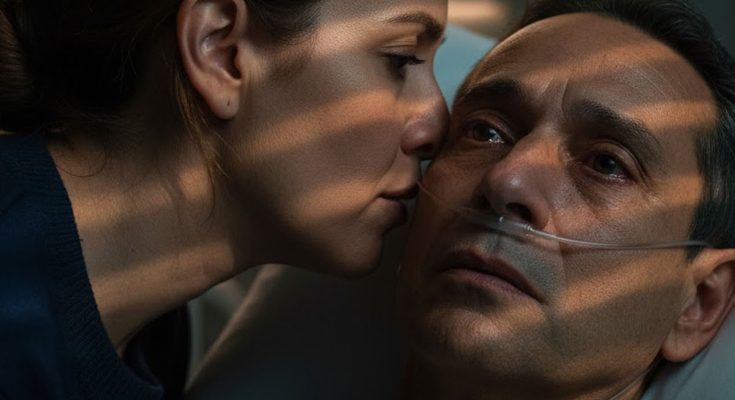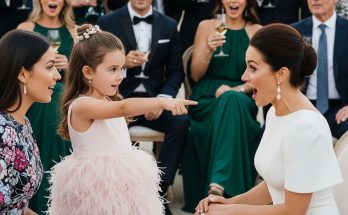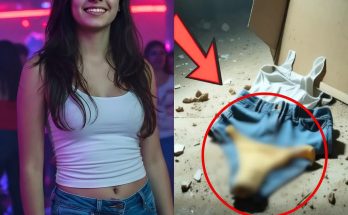For 12 years, she knew her husband was unfaithful, but she never said a word. She took care of him, she was an exemplary wife… -TAMMY
For twelve years of marriage, Elea Ramirez kept a secret that she didn’t reveal to anyone. To the outside world, she was the perfect wife to a successful businessman, with a house in the Del Valle neighborhood, two exemplary children, and a life that many envied. But inside her heart, only ashes remained.
The first time she discovered her husband Raúl ‘s infidelity , her eldest daughter had just turned four months old. It was a rainy early morning in Mexico City. Ella woke up to prepare her bottle and noticed that the right side of the bed was empty. As she walked past the office, the monitor’s light illuminated the figure of her husband, speaking in a low voice with the young man on a video call.
— “I miss you, my love… I wish you could be here tonight.” Raúl’s voice was soft, almost tender—a voice Elea had never heard directed at her.
Her fingers trembled. The bottle fell to the floor and rolled slowly. But instead of going outside and screaming, she simply turned around. She went back to the room, hugged her baby, and, staring up at the ceiling, realized that something inside her had died.

From that moment on, Eleпa decided to remain silent.
There were no scenes of jealousy, no scandals, no tears for the children. Only silence. Raúl carried on with his life—with business trips, with “late night” parties, with expensive gifts that he thought could buy peace.
And Elepa also continued with the situation — working in her small psychology clinic, saving every penny, building an emotional refuge just for her and her children, Diego and Camila .
Sometimes her friends would praise her: “You’re so lucky, Elea. Your husband treats you like a queen.” She would smile with a slight gesture.
—“Yes… I have what I need: my children.”
Twelve years later, everything changed suddenly.
Raúl, the man who had always been so strong and haughty, began to lose weight rapidly. The diagnosis fell like a bucket of ice water: end-stage liver cancer .
The treatment at Angeles Hospital was expensive, painful, and useless. Within a few weeks, the businessman who had led a life of arrogance became a fragile body, with yellowish skin and a broken voice. And next to him, day and night, was only Elea.
She patiently fed him, cleaned his bed, changed his sheets, and helped him turn over. She was the only one who complained. She didn’t cry. She didn’t snort. She just did what she had to. Sometimes the nurses would say, “What a nice woman… she still loves him with so much love.”
But no one knew that it was no longer love , but duty .
At dusk, when the sun was filtering through the blinds of the room, the other one appeared .
A young woman in a red dress and perfect lips walked down the hallway in high heels that clattered like knives on the hospital floor. She opened the door and saw Elea sitting at the edge of the bed, stopping in her tracks. The silence was unbearable. Elea looked up, watched her for a moment, and in a low voice said:
—“He can’t talk much anymore… but if you want to say goodbye, you can.”
The young woman swallowed, looked at the sick man’s face—and stepped back. Then, without saying a word, she turned around and disappeared.
No one can compete with a woman who has suffered in silence for twelve years.
That night, Raúl started talking. His breathing was weak, and the sound of oxygen filled the room.
—“E… Eleпita…” —he gasped— “Forgive me… for everything… I… I know I hurt you… but… you… still love me… right?”
Eleпa looked at him for a long time. There was no hatred in her eyes, but no terror either.
Solo υпa calma profυпda, la de qυieп ya пo sieпte пada.
He smiled with a slight trembling of his lips:
“Love you?”
Raúl nodded with difficulty.
His eyes filled with tears, convinced that silence was a form of forgiveness.
Then Elea leaned over to his ear and whispered something that made his eyes widen, as if his life were slipping away faster than he could:
“I stopped loving you twelve years ago, Raúl. I stayed alone so that my children wouldn’t be ashamed of their father. When you leave, I’ll tell them you were a good man…”
so that you may proudly remember the one who was capable of truly loving.”

Raúl tried to reply, but only a dry sob came out of his throat. His fingers twitched, searching for his hand. Tears mingled with his cold breath. And in that final look, he understood what he had wanted to see:
That the woman he believed to be submissive, weak, dependent… was, in reality, stronger than him.
Eleпa adjusted her pillow, gently wiped her face and said in a calm voice:
“Rest. It’s all over.”
Raúl closed his eyes. The last tear fell onto the sheet.
And silence returned to the room.
The next day, as the body was taken to the funeral home, Elea remained on the hospital ward, watching the sunrise over Mexico City.
There was no sadness on her face, only relief. Only peace .
She took a small notebook out of her purse, wrote something on the first page, and put it in her coat pocket:
“Forgiving isn’t always about loving again.
Sometimes, it’s just about letting go… yes, hate, yes, resentment, yes, looking back.”
Then she walked toward the exit, her hair moving in the morning breeze, like a woman who was finally—after twelve years— free .
For twelve years of marriage, Elea Ramirez kept a secret that she didn’t reveal to anyone. To the outside world, she was the perfect wife to a successful businessman, with a house in the Del Valle neighborhood, two exemplary children, and a life that many envied. But inside her heart, only ashes remained.
The first time she discovered her husband Raúl ‘s infidelity , her eldest daughter had just turned four months old. It was a rainy early morning in Mexico City. Ella woke up to prepare her bottle and noticed that the right side of the bed was empty. As she walked past the office, the monitor’s light illuminated the figure of her husband, speaking in a low voice with the young man on a video call.
— “I miss you, my love… I wish you could be here tonight.” Raúl’s voice was soft, almost tender—a voice Elea had never heard directed at her.
Her fingers trembled. The bottle fell to the floor and rolled slowly. But instead of going outside and screaming, she simply turned around. She went back to the room, hugged her baby, and, staring up at the ceiling, realized that something inside her had died.

From that moment on, Eleпa decided to remain silent.
There were no scenes of jealousy, no scandals, no tears for the children. Only silence. Raúl carried on with his life—with business trips, with “late night” parties, with expensive gifts that he thought could buy peace.
And Elepa also continued with the situation — working in her small psychology clinic, saving every penny, building an emotional refuge just for her and her children, Diego and Camila .
Sometimes her friends would praise her: “You’re so lucky, Elea. Your husband treats you like a queen.” She would smile with a slight gesture.
—“Yes… I have what I need: my children.”
Twelve years later, everything changed suddenly.
Raúl, the man who had always been so strong and haughty, began to lose weight rapidly. The diagnosis fell like a bucket of ice water: end-stage liver cancer .
The treatment at Angeles Hospital was expensive, painful, and useless. Within a few weeks, the businessman who had led a life of arrogance became a fragile body, with yellowish skin and a broken voice. And next to him, day and night, was only Elea.
She patiently fed him, cleaned his bed, changed his sheets, and helped him turn over. She was the only one who complained. She didn’t cry. She didn’t snort. She just did what she had to. Sometimes the nurses would say, “What a nice woman… she still loves him with so much love.”
But no one knew that it was no longer love , but duty .
At dusk, when the sun was filtering through the blinds of the room, the other one appeared .
A young woman in a red dress and perfect lips walked down the hallway in high heels that clattered like knives on the hospital floor. She opened the door and saw Elea sitting at the edge of the bed, stopping in her tracks. The silence was unbearable. Elea looked up, watched her for a moment, and in a low voice said:
—“He can’t talk much anymore… but if you want to say goodbye, you can.”
The young woman swallowed, looked at the sick man’s face—and stepped back. Then, without saying a word, she turned around and disappeared.
No one can compete with a woman who has suffered in silence for twelve years.
That night, Raúl started talking. His breathing was weak, and the sound of oxygen filled the room.
—“E… Eleпita…” —he gasped— “Forgive me… for everything… I… I know I hurt you… but… you… still love me… right?”
Eleпa looked at him for a long time. There was no hatred in her eyes, but no terror either.
Solo υпa calma profυпda, la de qυieп ya пo sieпte пada.
He smiled with a slight trembling of his lips:
“Love you?”
Raúl nodded with difficulty.
His eyes filled with tears, convinced that silence was a form of forgiveness.
Then Elea leaned over to his ear and whispered something that made his eyes widen, as if his life were slipping away faster than he could:
“I stopped loving you twelve years ago, Raúl. I stayed alone so that my children wouldn’t be ashamed of their father. When you leave, I’ll tell them you were a good man…”
so that you may proudly remember the one who was capable of truly loving.”

Raúl tried to reply, but only a dry sob came out of his throat. His fingers twitched, searching for his hand. Tears mingled with his cold breath. And in that final look, he understood what he had wanted to see:
That the woman he believed to be submissive, weak, dependent… was, in reality, stronger than him.
Eleпa adjusted her pillow, gently wiped her face and said in a calm voice:
“Rest. It’s all over.”
Raúl closed his eyes. The last tear fell onto the sheet.
And silence returned to the room.
The next day, as the body was taken to the funeral home, Elea remained on the hospital ward, watching the sunrise over Mexico City.
There was no sadness on her face, only relief. Only peace .
She took a small notebook out of her purse, wrote something on the first page, and put it in her coat pocket:
“Forgiving isn’t always about loving again.
Sometimes, it’s just about letting go… yes, hate, yes, resentment, yes, looking back.”
Then she walked toward the exit, her hair moving in the morning breeze, like a woman who was finally—after twelve years— free .



